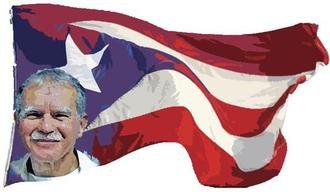Oscar López’s bittersweet freedom
 In a surprise action on Feb. 9, Puerto Rican political prisoner Oscar López Rivera returned to his homeland, Puerto Rico, after the second Obama Administration commuted his sentence in its last days in mid-January. But what so many people longed for — to greet him with hugs, Puerto Rican flags and slogans of national freedom, to make him aware of their love and gratitude — was impeded by the cruel, vengeful orders of the U.S. Empire.
In a surprise action on Feb. 9, Puerto Rican political prisoner Oscar López Rivera returned to his homeland, Puerto Rico, after the second Obama Administration commuted his sentence in its last days in mid-January. But what so many people longed for — to greet him with hugs, Puerto Rican flags and slogans of national freedom, to make him aware of their love and gratitude — was impeded by the cruel, vengeful orders of the U.S. Empire.
López Rivera arrived at the San Juan Airport accompanied by his daughter Clarisa López, his brother José López, his lawyer Jan Susler and elected officials: the mayor of San Juan, Carmen Yulín Cruz; the president of the City Council of New York, Melisa Viverito; and Congressperson Luis Gutierrez, Democratic Party representative for Chicago.
The people gathered to meet Oscar at the terminal where he would arrive were astonished by the speed of events and the absolute impossibility of greeting him. The officials accompanying Oscar on his trip from North Carolina, where he had been transferred from Terre Haute Prison in Indiana, walked quickly around him, trying to keep him hidden. They even put a cap on his head in an attempt to cover his face.
Despite those accompanying Oscar trying to cover the television lens, this writer was able to see through the cameras a part of his walk through the airport halls. These glimpses of Oscar’s face aroused immense joy as well as great indignation, feelings shared by many people judging by the many comments on social media.
Interviewed by the media about Oscar’s arrival, Puerto Rican hero and former political prisoner Rafael Cancel Miranda told how important it was to him to be greeted by thousands of Puerto Ricans at the airport in 1979. That’s when he arrived in PR with Lolita Lebrón, Irving Flores and Andrés Collazo after being pardoned by U.S. President Jimmy Carter. He spoke of the extraordinary joy — euphoria even — he felt to see thousands of people gathered, carrying Puerto Rican flags, when he reached Borinquen soil after 26 years in Yankee dungeons.
Oscar was deprived of this welcome. His lawyer Jan Susler said, “He is under strict supervision. He is in the custody of the Bureau of Prisons. If he wants to be in Puerto Rico, he has to be confined to his home. He has to meet the conditions … the most important, apart from complying with the law, is that he maintain a very low profile.” (elnuevodia.com, Feb. 9)
“Low profile” includes house arrest at the home of his daughter Clarisa, which he can leave only for medical appointments and to go to the Bureau of Prisons. He cannot talk to people with a prison record, be in any public hearing or be interviewed by the media. In addition, he must wear an electronic shackle until May 17, when he will finally finish his sentence after being a prisoner for 36 years.
Political context
Within the parameters of the U.S. “legal justice” system, there is no reason why his commutation could not have included Oscar’s immediate release. Not only is his continued control an open cruelty, it is a highly political act, preventing Oscar from being an active and cohesive element in the struggle for Puerto Rican independence.
The struggle for Oscar’s freedom has been endorsed by the most diverse Puerto Rican forces, from the current pro-statehood Governor Ricardo Roselló to pro-independence and socialist tendencies, along with religious communities of all beliefs and all social movements in between. Oscar is the symbol of the united will of a people to fight for what it considers just. That was also the way it was with the victorious struggle to remove the U.S. Navy from the Puerto Rican island of Vieques.
Now is a critical time for the Boriquen archipelago, where dangerous events are taking place. The first is the imposition of an overwhelming and dictatorial Fiscal Control Board (JCF) that seeks to bleed the working class to pay Wall Street’s bondholders. Among these bondholders is the vulture-funds firm of the now infamous John Paulson, one of the top advisers to President Donald Trump.
In addition, another administration has been established harmful to the Puerto Rican working class — that of Gov. Roselló, who imposes reforms to please the JCF while making Puerto Rican workers’ lives precarious. On top of all this, there is another proposal for a futile status plebiscite to be held on June 11.
Never before has the struggle for true Puerto Rican sovereignty been so crucial. We are reaching a crossroads at this terminal phase of capitalism — a phase that seeks profits at the cost of the very life of the working class — by eliminating all the achievements obtained through decades of struggle.

